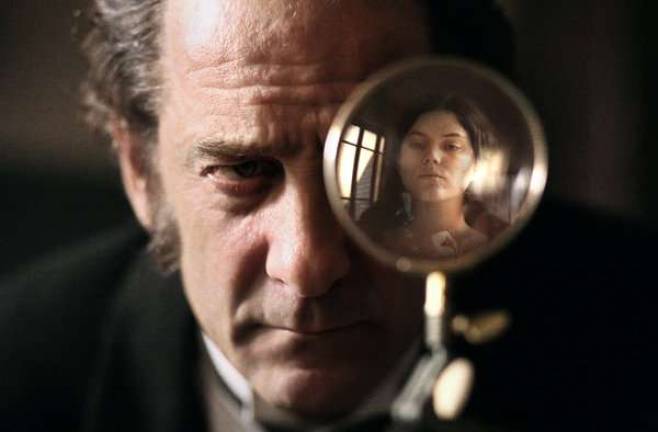Augustine

Alice Winocour's debut marks a very suitable case for treatment By Doug Strassler We first meet Augustine - a kitchen servant, the title character of director-writer Alice Winocour's impressive debut feature - in the middle of a major fit while working a very highbrow dinner. It's a convulsion so severe I expected her character to die. But Augustine (played by French singer Soko) survives, albeit with one shut eye and a paralyzed half of her body, submitted to the inspection of Dr. Jean-Martin Charcot (Vincent Lindon) at Paris' Salpêtrière psychiatric hospital. Augustine isn't completely the story of its suffering heroine once Charcot enters the picture, and while both prove fascinating characters, this very promising film left me wishing that Augustine had provided a bit more character study for its leads. Charcot, a real-life neurologist whose work directly influenced Sigmund Freud, quite quickly sees in Augustine a pawn to use in his quest to earn more research funding for Salpêtrière. He diagnoses Augustine with ovarian hysteria (a panacea diagnosis that will be familiar to those who saw Sarah Ruhl's play In the Next Room, or The Vibrator Play ? or its more neutered film adaptation, Hysteria). Charcot uses hypnosis to induce public seizures in Augustine, questioning the line between experimentation and punishment. Is he a puppeteer? For that matter, is she really as susceptible to him as the good doctor thinks she is? Winocour asks her audience bear silent witness to Charcot's treatment of Augustine, which eventually evolves into a transactional relationship in which he rewards her participation with a private room and dresses. Being a patient of his affords Augustine a better life than she has ever known as a member of the working class, and she knows he needs her as much as she desires a cure for her malady. While medical treatments could often be brutal, as Winocour painstakingly makes clear, Augustine's worst fear is for another patient to catch Charcot's attention. But there is also an underlying attraction between the two which feeds the power play. In one sequence, Charcot insists that Augustine stroke his pet monkey, leading to a rhythm in which this odd couple ends up rubbing against each other (Charcot, for the matter, is married to a Constance, very subtly played by Chiara Mastroianni, an upper-class woman who uses her status to help propel Charcot's career.) Later on, while spoon-feeding soup to Augustine, it becomes apparent that she now wields more influence in their relationship. Both Lindon and Soko offer skilled portrayals of two in an ever-changing relationship without ever judging their characters' deeds (or mis-deeds). In spite of all this, I wish Augustine were a little more?something. I wish it cut deeper or ran darker, exploring more of the impulses experienced by doctors treating patients with psychosexual disorders. Augustine is quite feminist in tone and has all the merit of an Edith Wharton novel, but lacks the requisite commentary on class ? Augustine may be taking advantage of her situation, but Charcot will always be in a position with more options than his patient. I also wish the film's climax, inevitable and earned, was actually just the springboard to something greater and more revelatory. Still, these are benign wishes. Augustine remains worthy of observation.